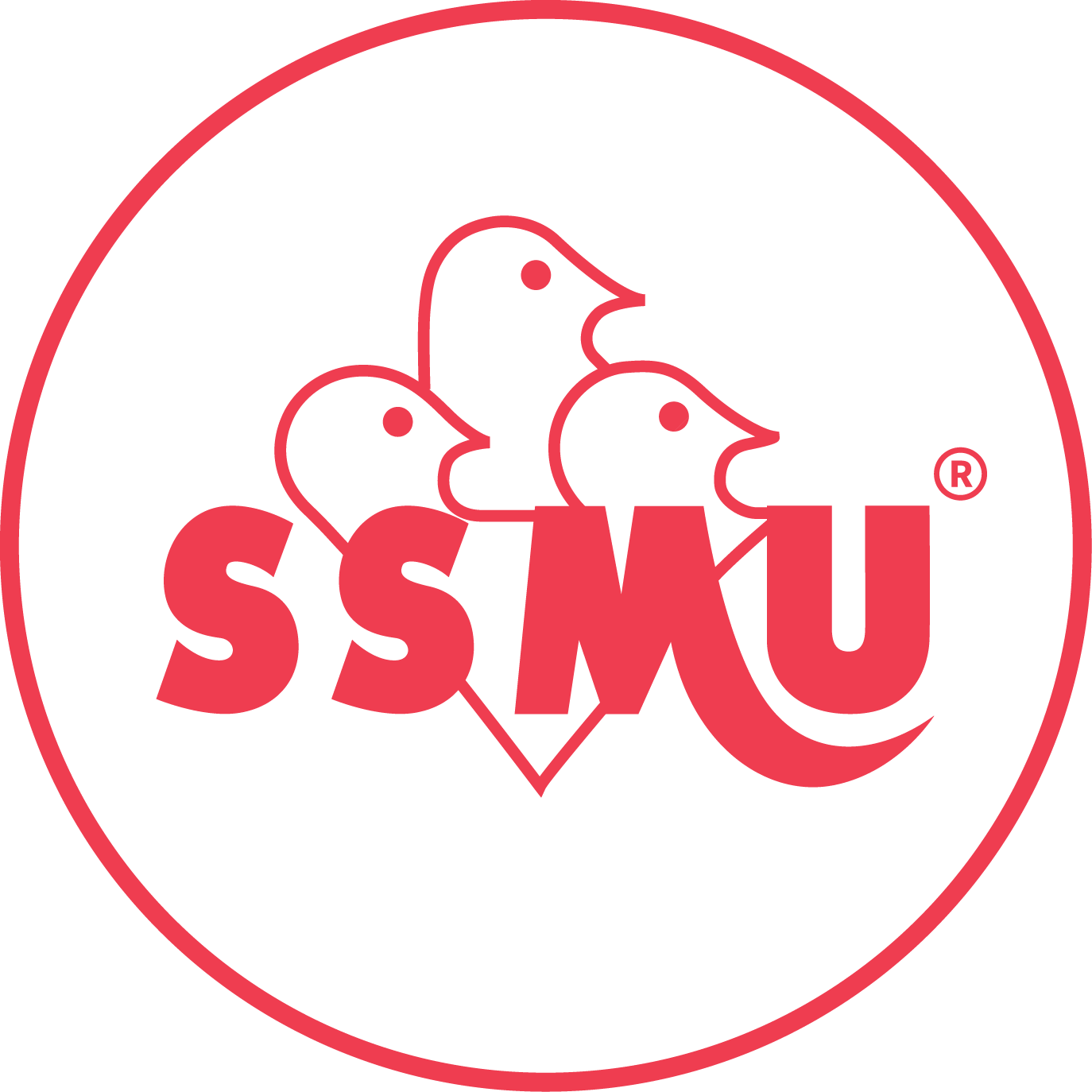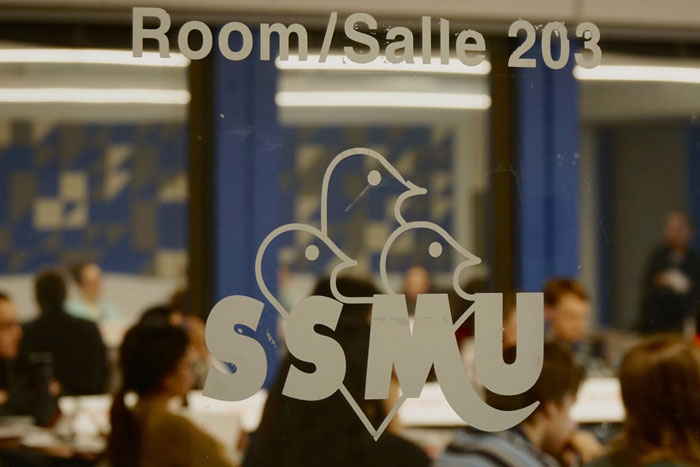 STUDENTS' SOCIETY OF MCGILL UNIVERSITY
STUDENTS' SOCIETY OF MCGILL UNIVERSITY
Who They Are
The Students’ Society of McGill University (SSMU) is the representative and governing body for all students pursuing undergraduate and professional degrees at McGill. Its base of operations is the University Centre—also known as the Shatner Building, named after a particularly famous graduate. From there, it organizes student events, oversees close to 300 clubs, and negotiates with other governance bodies—like the Senate and Board of Governors—on behalf of its constituents.
What They Do
SSMU is led by seven student executives who are elected at the end of each academic year. The SSMU Executive mandate includes supervising undergraduate clubs and extracurricular activities, managing and ensuring the sustainability of Gerts and other long-term operations, advocating for student interests in the Senate, and planning social events, including Frosh. SSMU’s policies are decided at the Legislative Council, where the executives sit with 30 councillors who represent both faculties and extracurricular clubs. Any councillor can propose a motion, which is then voted on at Council and may become law. Additionally, several councillors deliberate McGill policies at the McGill Senate. The Judicial Board, which ensures that SSMU adheres to its constitution, is comprised of seven students, predominantly from the Faculty of Law. Undergraduate students can directly influence SSMU by attending its General Assemblies and Referendums, both of which are held once every semester.
Recent Events
Last academic year, SSMU enacted policies to provide cost-free birth control coverage and menstrual products for students. It also supported Floor Fellows in successfully bargaining with McGill for a wage, in addition to the room and board they had received previously. At the end of the Winter 2017 semester there were a number of resignations within SSMU. In April, SSMU announced the permanent closure of its student-run cafeteria, Sadie’s, for financial reasons. Currently, SSMU is drafting a Gendered and Sexualized Violence Policy.
 POSTGRADUATE STUDENTS' SOCIETY
POSTGRADUATE STUDENTS' SOCIETY
Who They Are
The Postgraduate Students’ Society (PGSS) is an association that represents graduate students and postdoctoral fellows at McGill. The Society is led by six executive officers, six supporting administrative staff members, and five commissioners who assist officers with coordinating activities and implementing policies. PGSS Council is the Society’s highest governing body, and consists of elected students from each postgraduate student association (PGSA). Each PGSA has a number of seats on Council proportional to the size of its student population. To reach quorum, one third of the councillors must be present at Council. PGSS Council is responsible for ensuring that policies reflect the values of constituents, approving and amending the PGSS budget, and holding officers accountable for their actions.
What They Do
PGSS representatives speak on behalf of postgraduates, meeting once a month to debate and vote on policies related to the Society’s long-term vision. Additionally, it liaisons with other governance bodies at McGill and beyond. Part of PGSS’ mandate is to provide an accessible social environment and improve the quality of student life for postgraduate students. In doing so, the executive plans events for students, including cocktails, meditation hours, and workshops, most of which take place at its headquarters, the Thomson House.
Recent Events
In an April 2017 referendum, PGSS renewed its Health and Dental Plan to increase the services available for students such as dental preventative services and physiotherapy coverage. Over the past few years, PGSS has prioritized the development of an Orientation Week for its students. This year, the third annual PGSS Orientation will conclude on Sept. 13, the programming for which includes pub and food crawls, a movie night, a barbecue, a Macdonald Campus Activity Day, and a bike tour.
 BOARD OF GOVERNORS
BOARD OF GOVERNORS
Who They Are
The McGill Board of Governors (BoG) is the university’s governing body, comprised of 25 voting members and two non-voting student observers. The voting members include two administrative staff—Principal and Vice-Chancellor Suzanne Fortier and Chancellor Michael Meighen—two professors, two Senate representatives, three Alumni Association representatives, two professors, and two administrative and support staff representatives. Two students are voting members of the BoG: SSMU President Muna Tojiboeva and PGSS President Jacob Lavigne. Student observers from the McGill Association of Continuing Education Students (MACES) and the Macdonald Campus Students’ Society (MCSS) sit on the BoG as non-voting members.
What They Do
The BoG serves as the final authority over all of the university’s academic, business, and financial affairs, and is responsible for the maintenance and administration of daily activities at McGill. The BoG is comprised of eight standing committees, including the Building and Property committee, the Finance committee, and the Committee to Advise on Matters of Social Responsibility. The BoG is scheduled to meet five times over this upcoming school year.
Recent Events
Over the course of 2016, the BoG held several open forums during which students were invited to voice their concerns over administrative decisions. Most notably, the Open Forum on Sustainability was held in September 2016 to address student concerns over the campus’ carbon footprint after the BoG’s vote against divesting from fossil fuel companies. The BoG also held a closed session on May 25 of this year, during which they voted to reappoint Principal and Vice-Chancellor Suzanne Fortier for a second five-year term, set to begin July 1, 2018.
 SENATE
SENATE
Who They Are
The Senate governs all academic policy at McGill, and includes representatives from all of McGill’s constituent groups, including students, faculty, staff, administrators, members of the Board of Governors, and alumni. Members of the Senate, called “Fellows,” are either elected, appointed, or given membership based on their office. Of the 21 student senators, 13 are elected by SSMU, including the SSMU President and Vice-President University Affairs. The remaining eight include two members of MACES, one member of MCSS, and five members of the PGSS, including a single postdoctoral scholar.
What They Do
The Senate is mandated to govern academic policies, such as the development of curricula, regulations for admissions, and requirements for degrees, diplomas, and certificates. It additionally takes on a much broader role at McGill, including managing the university's libraries, developing its infrastructure, and administering Student Services. The Senate is comprised of nine standing committees, which include the Senate Steering Committee, the Committee on Libraries, and the Honorary Degrees and Convocations Committee. The Senate meets on a monthly basis, with its first session in September and its last in May. During Senate meetings, standing committees deliver reports, senators hold Question and Response sessions, and senators vote on policies and nominations.
Recent Events
On Nov 23, 2016, the Senate unanimously approved a Policy Against Sexual Violence, the first policy of its kind in McGill’s history. The policy defines sexual violence and creates university infrastructure for disclosing, reporting, and responding to such incidents at McGill. In May 2017, the Senate delivered a number of revisions and expansions to the Policy on Harassment, Sexual Harassment and Discrimination Prohibited by Law and approved appointments to many staffed positions created by the Policy, most notably eight Assessors tasked with the intake and management of reports of sexual harassment.







